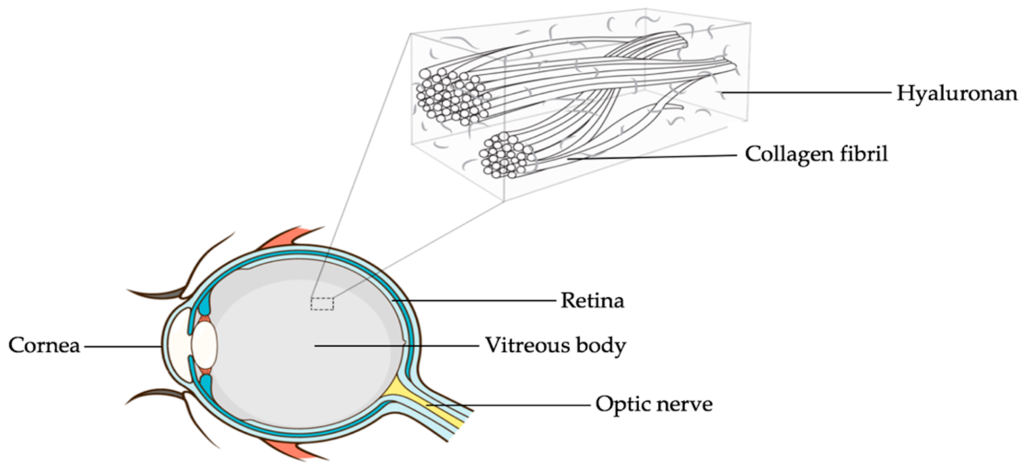The vitreous gel, that clear, jelly-like substance filling the eye’s interior, requires specific nutritional support to maintain its unique structure as we age. This specialized tissue consists primarily of water (99%), with the remaining components including collagen fibers, hyaluronic acid, and various proteins that collectively create its gel-like consistency. When this delicate architecture deteriorates through aging or other factors, people experience increased floaters, flashes, and potential vision disturbances that can impact daily function.
Several nutritional compounds show promise for supporting vitreoushealth by addressing the core structural components and protective mechanisms within this specialized ocular tissue. These supplements work through multiple pathways, including building blocks for structural elements, protecting against oxidative damage, reducing inflammatory processes, and supporting proper hydration status. While no supplement can completely reverse existing vitreous degeneration, certain compounds may help strengthen remaining structures and potentially slow future deterioration.
Collagen precursors
The vitreous framework depends heavily on type II collagen fibers that provide structural integrity while maintaining optical clarity. Several nutrients serve as essential precursors and cofactors for healthy collagen synthesis within the eye. Vitamin C is a required cofactor for collagen formation enzymes while protecting existing collagen from oxidative damage. Research indicates that vitamin C concentrations in the vitreous decline with age, potentially compromising ongoing collagen maintenance. The amino acids glycine, proline, and lysine form the building blocks of collagen protein. Inadequate availability of these amino acids can limit the body’s ability to synthesize and repair collagen structures throughout the vitreous. Some specialised formulations include these targeted amino acids in specific ratios designed to support optimal collagen production for ocular tissues.
Hyaluronic acid support
- Glucosamine – Provides essential building blocks for hyaluronic acid synthesis, the gel-like substance that gives vitreous its cushioning properties.
- Chondroitin – Works synergistically with glucosamine to support proper synthesis and maintenance of vitreous gel components.
- MSM (methylsulfonylmethane) – Contributes sulfur for proper cross-linking of structural molecules within the vitreous.
- N-acetyl glucosamine – Offers an alternative precursor form that some research suggests may have enhanced bioavailability.
- Manganese – A cofactor for enzymes synthesizing vitreous ground substance components.
These compounds support the gel-like matrix surrounding collagen fibers, maintaining proper spacing and hydration throughout the vitreous structure.
Antioxidant protection
The vitreous faces ongoing oxidative challenges from light exposure, metabolic processes, and environmental factors. Several antioxidant compounds demonstrate a particular affinity for protecting vitreous components.
- Astaxanthin, a carotenoid with exceptional antioxidant properties, crosses the blood-retinal barrier and concentrates in ocular tissues, where it neutralises free radicals before they can damage delicate vitreous structures.
- Alpha-lipoic acid offers unique benefits due to its solubility in water and fat environments, allowing it to protect various vitreous components simultaneously. This universal antioxidant also helps regenerate other antioxidants like vitamins C and E after they neutralise free radicals, extending their protective capacity.
Regular antioxidant support helps prevent the collagen cross-linking and fragmentation that contribute to vitreous deterioration with age.
Hydration factors
Proper vitreous function depends on optimal hydration maintained by carefully balancing osmotic factors and water-binding molecules. Specific nutrients support the vitreous gel’s hydration status both directly and indirectly. Adequate electrolyte balance, particularly potassium and magnesium, helps maintain proper fluid distribution throughout ocular tissues, including the vitreous. Beyond basic hydration, specific bioflavonoids help strengthen microscopic blood vessels surrounding the vitreous, reducing fluid leakage that disrupts vitreous consistency. These compounds, found naturally in citrus fruits and berries, support vascular integrity while providing antioxidant protection. The synergistic relationship between proper hydration and structural integrity highlights the importance of comprehensive nutritional support for vitreous health. Nutritional support for vitreous structures requires addressing multiple biological pathways simultaneously through carefully selected compounds that work synergistically rather than in isolation.

